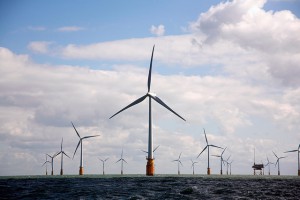By Davis Wax
Editorial assistant, Spring/Summer 2013
Over the past few weeks there has been a spurt of environmental and energy news in North Carolina and its capital, Raleigh. The developing issues include departing Charlotte-based Duke Energy CEO Jim Rogers being considered for the President’s cabinet, a new bill looking to end state environmental and health rules, and the governor’s endorsement of offshore wind power.
Jim Rogers in Energy Spotlight, Mixed Record and All
With Department of Energy Secretary Steven Chu officially resigned, who will become the DOE’s new chief? The business world has speculated that Jim Rogers, the outgoing CEO of Duke Energy, is a likely candidate.
GreenTech Media cited his experience with coal, gas and nuclear industries and Bloomberg Businessweek highlighted his solar and wind experience as well as his potential to bring an energy policy that “sharply reduces carbon emissions”. Rogers’ role in bringing the Democratic National Convention to Charlotte last year may also improve his chances of becoming President Obama’s head adviser on energy.
While Rogers has repeatedly stated his disinterest in joining the president’s cabinet, John Downey at the Charlotte Business Journal has pointed to Rogers’ recent Bloomberg Television interview as a sign that the out-the-door CEO has considered what he would do in such a position. When asked what he would bring to the DOE job, writes Downey, Rogers cited his years of experience in the energy sector and being able to get “the balance right between cheap, affordable energy and meeting our environmental goals.”
Under Rogers, however, Duke Energy has had a mixed reputation in supporting renewable energy in North Carolina. The company is still a paying member of the American Legislative Exchange Council, or ALEC, which creates model state laws that frequently roll back health and environmental protections in favor of promoting industry.
N.C. Rep. Mike Hager, a former Duke Energy engineer and member of ALEC, believes he has the support to weaken or even eliminate the state’s Renewable Energy and Energy Efficiency Portfolio Standard, which, according to a 2012 energy census, has helped maintain more than 15,000 clean energy jobs and produce a 3 percent industry growth over the past year.
Though Duke has officially taken an emissions-reducing position, the company has taken action against clean and renewable energy in its design input for the group’s model bill, the Electricity Freedom Act.
Mostly importantly, the bill demonizes state renewable energy mandates, which are known collectively as the Renewable Portfolio Standards (RPS). Including North Carolina, the RPS is active in 29 states and ensures that utilities will source a certain percentage of their energy to renewables by a chosen target date.
In favor of keeping costs low in the present, opponents are choosing to overlook the savings in healthcare costs, the potential to significantly downsize pollution and the opportunity for states to become energy-independent — all while moving away from reliance on fossil fuels — that the RPS promises.
Though it is clear Rogers is the most talked-about name for the role of DOE chief, Duke’s unwavering support for ALEC raises concerns about what his vision of our energy future would be, and whether he truly wishes to consider economic viability and environmental concerns on equal grounds. Can we really afford to weigh protecting our communities, our states and our planet against protecting the profitability of the fossil fuel market?
N.C. Environmental Rules Targeted First in New Bill
A movement to simply end all state rules — with health and environmental rules scheduled to expire first — is at work in the North Carolina state senate in the form of Senate Bill 32.
On February 4, the bill in question, “Periodic Review and Expiration of Rules,” was introduced to the North Carolina legislature by Sen. Fletcher Hartsell (R-Cabarrus). The state’s administrative code Title 10A, which concerns health and human services, would have its rules lifted by the end of 2016. The rules of Title 15A, which involves the state’s environment and natural resources, would be out by the following year.
Basically, the current administration would be able to oversee a complete elimination of established environmental protection standards, monkeywrenching ongoing conservation and pollution control programs.
North Carolina’s natural areas will be in a critically vulnerable state as current regulatory measures for cleaner water and air go out the window. Plus, during the lull before new oversight guidelines are implemented, there will be little to no gains for health and environmental protection.
With a bill to remove environmental experts from state commissions already passed in the senate, majority legislature over the past few weeks has proven that N.C. Republicans are on a crusade against environmental protection. What they seem to favor instead is deregulating industry by making dangerous polluting practices just another day at the job.
Gov. McCrory Backs Offshore Wind in N.C.
It quickly circulated more than a week ago that Gov. Pat McCrory had decided to back commercial wind farms off the coast of North Carolina. He expressed his support in a letter to the Bureau of Ocean Energy Management, Regulation and Enforcement, claiming the offshore wind industry could bring some 10,000 jobs to the state and around $22 billion in novel economic activity.

September 2010: Vattenfall opened the world’s largest offshore wind farm, Thanet Offshore Wind Farm, off England’s southeast coast. Photo by Nuon
Proponents of renewable energy across the country have had reason to rejoice at McCrory’s pro-wind stance, a stance likely instigated by the U.S. Department of Interior making offshore leases readily available and a wind-endorsement from the U.S. Department of Energy.
Others have been waiting for the country to take a stronger stance on wind for some time. While many European countries and two Asian countries have already built offshore wind farms to aid their energy grid, the U.S. has yet to make use of its ample coastlines for similar endeavors.
Harvard Ayers, professor emeritus at Appalachian State University wrote in an editorial in the Winston-Salem Journal that “many readers may not realize that North Carolina has the best offshore wind resources on the East Coast.” Ayers reveals the potential capacity of the state’s coastal wind resources could reach an incredible 50,000 megawatts — “the equivalent of more than 20 big coal or nuclear plants,” he writes.
Gov. McCrory, however, appears to follow an “any energy is good energy” mantra as he also supports bringing fracking to the state as well as offshore drilling for oil. McCrory and other state governors are planning to petition Washington, asking for permission to explore the potential for such drilling off the East Coast.
The state could be at a critical moment, though, one which would answer the question about what kind of energy it will side with for the future — clean or carbon-based?




Leave a Reply